Perhaps you dream of a hot cup of coffee and a beautifully glazed doughnut as a good breakfast combo. Certainly, it may be delicious.
But you may also be wondering, with type 2 diabetes or prediabetes, is eating a doughnut going to end up a blood sugar disaster?
Let’s look closer…
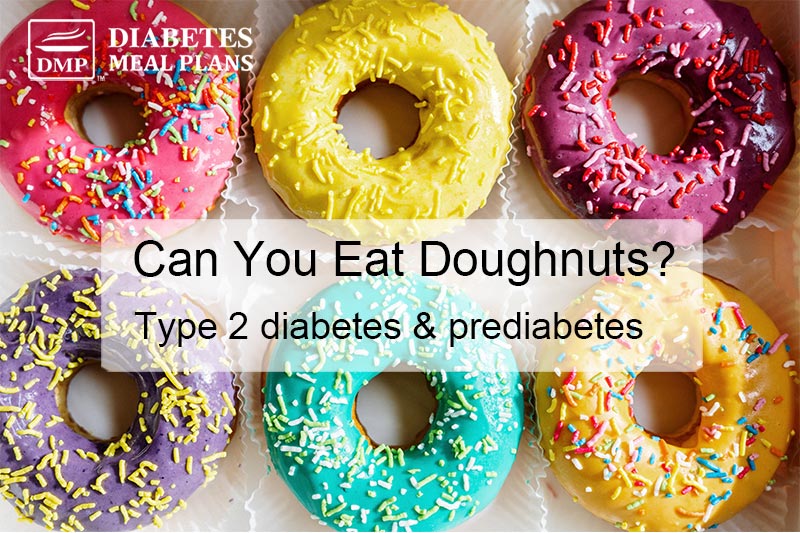
Doughnut Nutrition Facts
The nutrition facts for one simple glazed doughnut from Krispy Kreme are:
- Calories: 190
- Carbohydrates: 21g
- Added Sugar: 10g
- Fiber: 0g
- Protein: 2g
- Fat: 11g
This breakdown makes sense when you think about what a doughnut actually is: made of refined grains (often white flour), deep fried in vegetable oil, filled with added sugar, and glazed with a finish of thick layered sugar.
While dietary fat certainly isn’t the enemy, the oils used to make doughnuts are not the healthy kind of fat. Cheap vegetable oils tend to be inflammatory, unlike the healthy omega-3 fats found in seafood, tree nuts, and avocados.
The refined wheat flour and added sugars found in doughnuts are what we call “simple carbs.” These carbs are lacking in fiber and most other nutrients. Plus, they are immediately broken down during digestion and absorbed into the bloodstream.
This means you may get a quick burst of energy immediately, but a big blood sugar spike and hours of groggy exhaustion to follow.
Chowing down on simple carbs for energy is a “buy now, pay later” kind of situation. The short-lived excitement of a tasty treat isn’t worth the blood sugar rollercoaster you’ll be riding for the rest of the day.
Different Doughnuts Compared
Now you may be wondering, are all traditionally-made doughnuts equally bad?
The answer is (mostly), yes.
Let’s see how doughnuts from two big chain shops (Dunkin Donuts and Krispy Kreme) compare:
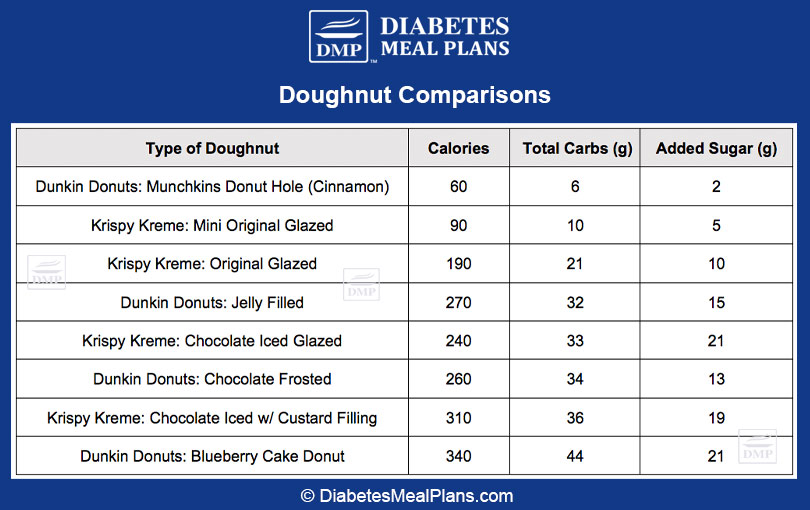
Yeah, that’s a whole lot of sugar!
If you absolutely had to have a sweet treat from one of these doughnut shops, we would recommend choosing the smallest-sized option with the least amount of sugar.
In this case, that would be either the mini original glazed donut from Krispy Kreme (just 10g of carbs) or a single donut hole from Dunkin Donuts (just 6g of carbs in the Cinnamon or Old Fashioned flavors).
Fun fact: while the official spelling of this baked treat is “doughnut,” the shortened term “donut” became popular in the late 20th century when Dunkin’ Donuts shops began popping up all over!
How Sugar Affects Type 2 Diabetes
You may already know that processed food and added sugar aren’t good for you. This is pretty standard health advice.
But did you know that reducing added sugar and carbohydrates can significantly improve your health if you have type 2 diabetes or prediabetes?
This is because when you have insulin resistance, consuming more carbs than your body can handle leads to high blood sugar levels and chronic inflammation.
Carbs, especially “simple carbs” like pastries, white bread, candy, and soda, cause a huge blood sugar and insulin response when compared to protein and fat.
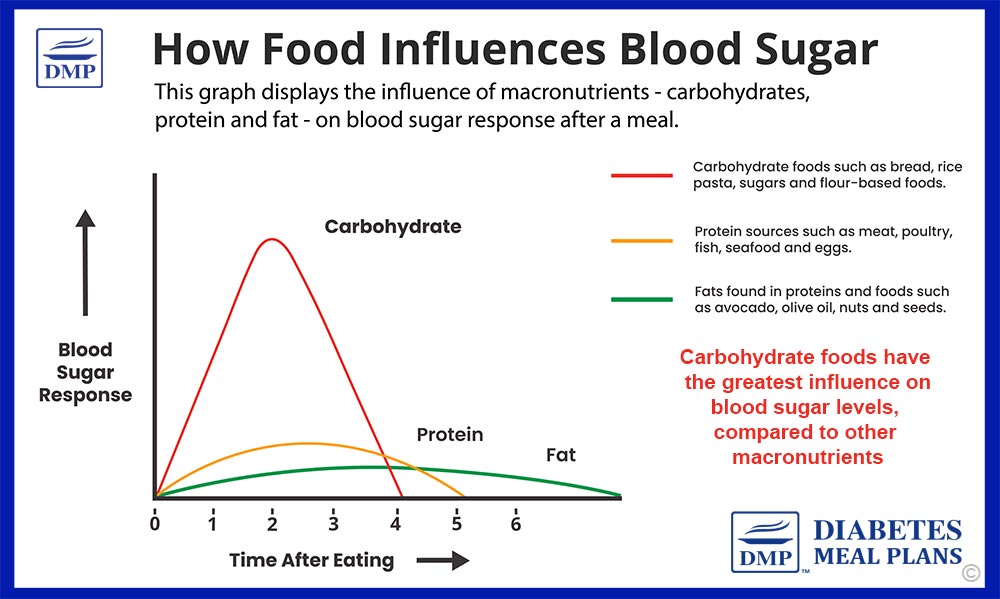
Therefore, reducing your added sugar and total carb intake is a key factor in diabetes management.
Changing your diet may actually be able to stop, and in some cases reverse, the progression of diabetes and other co-occurring health issues!
According to a landmark study on sugar intake and metabolic diseases, limiting excess sugar intake may help fight obesity and high blood pressure while improving glucose tolerance and regulating insulin levels.
We like to take things one step further and encourage our members to reduce carbohydrates overall (not just “added sugars”) for even greater health effects.
A variety of studies have found the benefits of a low carb diet to include:
- Significant reduction in need for diabetic medications (up to 52% reduction in some cases!)
- Reduction in blood glucose levels and HbA1c
- Weight loss
- Reduction in “bad” LDL cholesterol and increase in “good” HDL cholesterol
- Reduction in inflammatory markers
We also demonstrated, in our clinically proven T2Diet Program, that getting amazing results with your blood sugar and health, can occur in as little as 16 weeks – after which you can maintain healthy levels long term.
The point being: doughnuts don’t really fit into a healthy diabetic diet!

What to Eat Instead of Doughnuts
By now you can probably see why we don’t “go nuts” for doughnuts!
Doughnuts are not a good choice for diabetics because of the amount of carbs (sugar), the processed vegetable oils, and the lack of other nutrients.
To power through your day with stable energy, you need blood sugar-stabilizing nutrients like fat, protein, and fiber – not sugar!
Earlier we mentioned the best options for donuts at shops like Krispy Kreme and Dunkin Donut, but again, we don’t recommend options like the mini doughnuts and donut holes unless you’re in a real pinch, or want to take a very occasional indulgence.
In general, the most diabetes-friendly items at these doughnut shops are:
- Unsweetened or very low sugar coffees (iced or hot)
- Savory, bread-free options like the Bacon & Cheddar or Egg White & Veggie Omelet bites at Dunkin Donuts
But what if you’re really in the mood for something to satisfy your sweet tooth?
Low Carb Doughnuts Online
While they’re few and far between (and they tend to be quite pricy), there are some low carb doughnut options available online:
- These chocolate-powdered doughnuts contain just 1g of net carbs and can be found online at Low Carb Foods and Walmart.com
- These monk fruit and stevia-sweetened cinnamon “keto doughnuts” from Amazon contain only 6g of net carbs
- At just 2g of net carbs per serving, these erythritol-sweetened powdered doughnuts (Amazon) may be a tasty alternative to traditional doughnuts
Delicious Diabetic-Friendly Desserts to Make at Home
Finally, we’ve got more than a few recipes for healthy, low carb alternatives to the sugary desserts you’ll find in shops and on store shelves.
Next time you’re craving a treat, give one of these treats a try!
- Thick and creamy sugar-free cheesecake
- Fluffy, no-bake chocolate pudding
- Strawberry vanilla coconut chia seed pudding
For more info on best foods to eat, grab our food list below.

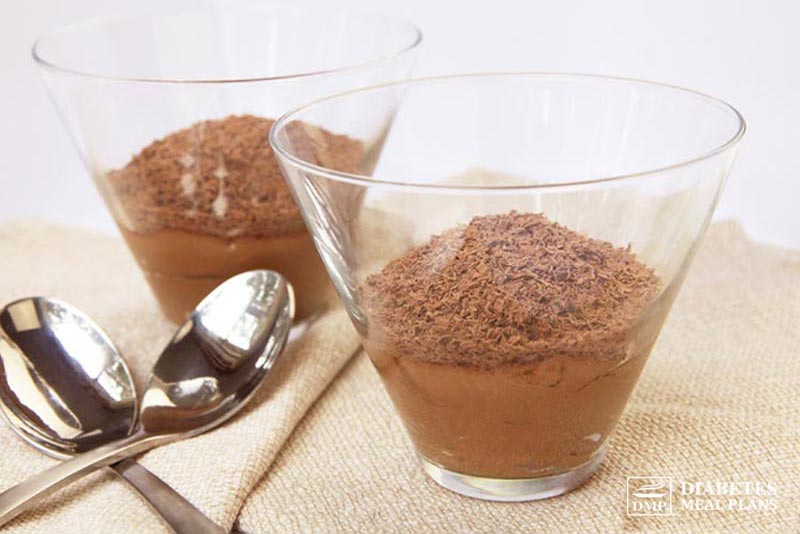

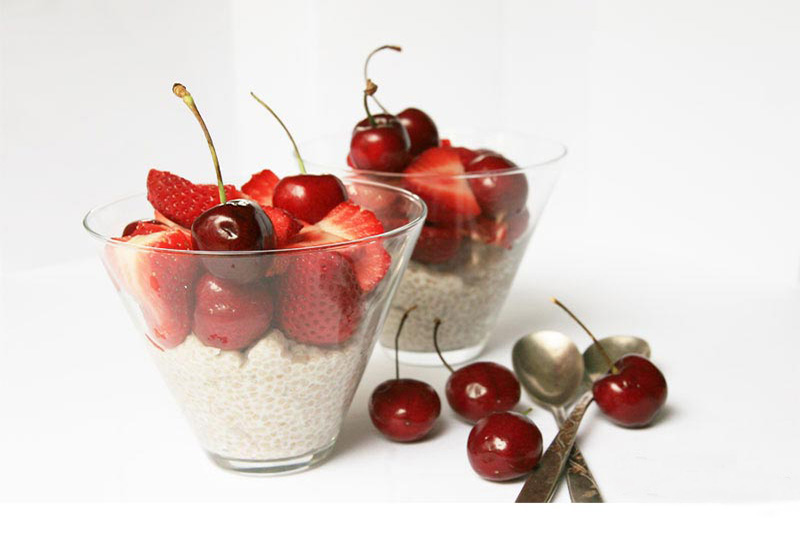
Leave a Reply